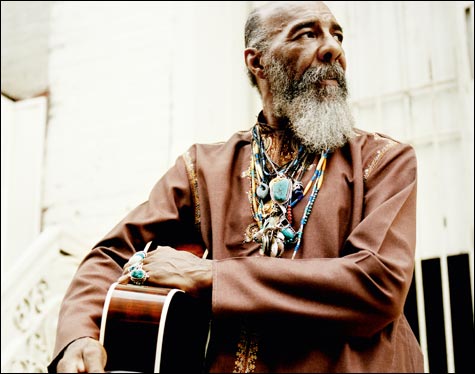
HOLD YOUR NOTES: “I don’t really record a record. I perform it. So I don’t have to sing a tune 20 times because of some producer’s ear.” |
It's a stirring piece of footage: near the beginning of Michael Wadleigh's film of the 1969 Woodstock festival, a bearded man in an orange robe walks up, already furiously strumming his guitar as he nears the center-stage stool. It isn't dark yet, and chaos surrounds him as people are still pouring in and staff are frantic. He sits down and plows through a riveting version of the anti-war screed "Handsome Johnny," his thumb-over-the-neck strumming working up an intense head of steam. Although the song ends, he keeps chugging, slowly building another manic foundation. This time, he opens his mouth and repeats one word, over and over: "Freedom." The song is completely improvised, and every time I see this clip, I'm overcome by the way Richie Havens allows the music to overtake him, even amid all the distractions. What was it like to step on stage and walk off the cliff into the unknown?
"I'd been put on the spot before, but that time I put myself on the spot, you know?" says Havens in his instantly recognizable baritone. "When I go on stage, I usually know the first and last songs that I'm gonna do, but the rest is open space! I tune my guitar between songs, a song comes to me, and I'll sing that. I follow the music to the stage."

Havens, who comes to the MFA this Sunday, has been following his muse since he was a child. He started out singing in various doo-wop groups in Brooklyn in the '50s, only to gravitate to the burgeoning countercultural Greenwich Village folk scene of the early '60s, a move that would lead to his opening slot at Woodstock. "I was 19 when I started [singing doo-wop]. And you know, doo-wop was show business, right? But little did we really know that among the love songs, there were songs of protest, like the songs I'd hear years later. For instance, Frankie Lymon sang 'Why Do Fools Fall in Love?' — good question, right? But he also sang this song: 'No no no no no, I'm not a juvenile delinquent!' Now how about that in the 1950s?"
Still, it was an eye-opening experience for Havens when a trip to Greenwich Village in 1961 revealed a completely new world of poetry, music, and meaning. "The older guys in the neighborhood [in Brooklyn], they were all calling us 'beatniks.' Me and my partners were all like, 'What the hell is a beatnik?' We're still singing doo-wop on the corner, right? So then my friend comes to me two or three days later and says, 'See that guy over there, with that hat — he's a beatnik! And there's more in the Village!' And I said, 'Oh, okay, let's go see who "we" are!' So we went over there and we found the poets. So those older guys, they were trying to be inflammatory, but they were helping us out — it was the best thing that ever happened to us!"
When Havens made it to the Village and started hearing the pre-Dylan folk of Fred Neil, Dino Valenti, and Tom Paxton, he knew what he wanted to do. "The songs that those guys sang, they moved me so much that I wanted to sing them. But I wasn't the front guy in all of my doo-wop groups. I was the baritone, I was the choreographer, I was the stay-in-key guy, because I had a deep voice. But I would sit in the coffeehouses and clubs, night after night, and hear songs like 'Tear Down the Walls' and 'The Dolphin Song' and 'To Be a Man.' One night, Fred Neil comes up to me and says, 'Richie, you've been sitting here for six months singing my damn songs from the audience — take this guitar home and learn how to play them yourself!' So he hands me a guitar, which I took home. I sat down with this guitar, tuned it up to a major chord, and I just started playing it. I learned a bunch of these songs in three days, and I went back and I played all of the songs for Freddie, and he flipped out and said, 'If I'd known I'd be giving you my damned job!' "
Havens got his start as a performer in the Village at the legendary Cafe Wha?, where he joined a tight-knit community of like-minded artists and musicians, or "poets" as he likes to think of them. "The guy who ran Cafe Wha?, Manny Roth, he was the first guy to start paying folk singers to play, $25 a week, which was a lot of money back then! He had this little kid, his sister's kid, this boy around four or five years old, and there were a bunch of times where Manny would come down to the club and say, 'Hey Richie, would you watch the kid, I'll be back in half an hour,' and then he'd disappear for three hours! And this kid, he wound up, decades later, being in this really popular rock band, I can't remember what they were called. But that kid, his name was David Lee Roth. I halfway brought him up!"